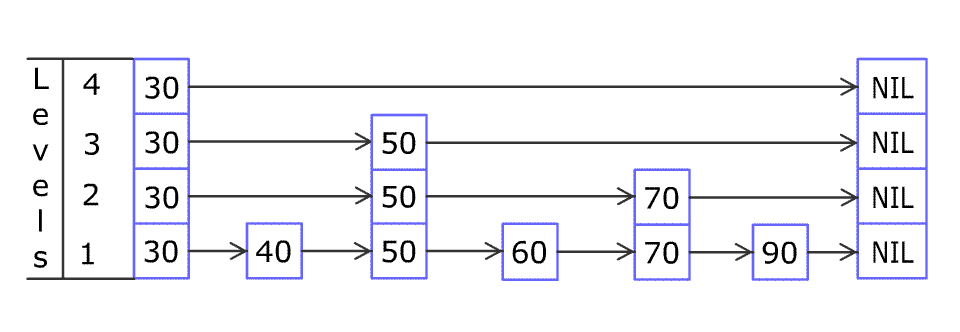SkipList算法实现
SkipList是一种快速查找链表,链表元素的是有序的。由W.Pugh发明于1989年。
其算法复杂度如下:
Average Worst case
Space O(n) O(n log n)
Search O(log n) O(n)
Insert O(log n) O(n)
Delete O(log n) O(n)

(图片来源于WiKi)
均算法复杂度不亚于AVL和红黑树。其数据结构和操作也简单。AVL树和红黑树为保
持平衡,维护树的平衡代价高。
SkipList 现用于Redis,LevelDB等开源项目, 维基百科可以看它到很多应用场景。
根据W.Pugh的论文,其算法实现如下:
#include <cstdio> #include <iostream>
#include <cstdlib> #include <random> using namespace std; #define MaxLevel 5 typedef struct SkipListNode { int value; int key; int level; SkipListNode* forward[MaxLevel]; } SkipListNode; typedef struct SkipList { SkipListNode* head; int level; int length; } SkipList; SkipListNode* makeNode(int level, int key, int value) { SkipListNode* pNode = (SkipListNode *)malloc(sizeof(SkipListNode)); if (!pNode) { return NULL; } pNode->key = key; pNode->value = value; pNode->level = level; for (int i = 0; i < MaxLevel; ++i) pNode->forward[i] = NULL; return pNode; } void initSkipList(SkipList *pSkipList) { if (!pSkipList) return; SkipListNode* head = makeNode(0, 0, 0); if (!head) return; pSkipList->head = head; pSkipList->length = 0; pSkipList->level = 1; for (int i = 0; i < MaxLevel; i++) pSkipList->head->forward[i] = NULL; } int randomLevel() { int newLevel = 1; while ((rand() & 0xFFFF) < (0.4 * 0xFFFF)) ++newLevel; return newLevel < MaxLevel ? newLevel : MaxLevel; }
bool insertNode(SkipList *pSkipList, int searchKey, int newValue) { SkipListNode* update[MaxLevel]; if (!pSkipList) return false; SkipListNode* pNode = pSkipList->head; if (!pNode) { return false; } for (int i = pSkipList->level - 1; i >= 0; i--) { while (pNode->forward[i] && pNode->forward[i]->key < searchKey) pNode = pNode->forward[i]; // pNode->key < searchKey < pNode->forward[i]->key update[i] = pNode; } pNode = pNode->forward[0]; if (pNode && pNode->key == searchKey) { pNode->value = newValue; } else { int level = randomLevel(); if (level > pSkipList->level) { for (int i = pSkipList->level; i < level; i++) { update[i] = pSkipList->head; } pSkipList->level = level; } pNode = makeNode(level, searchKey, newValue); if (!pNode) { return false; } for (int i = 0; i < pSkipList->level; ++i) { pNode->forward[i] = update[i]->forward[i]; update[i]->forward[i] = pNode; } pSkipList->length++; } return true; } SkipListNode* searchNode(SkipList *pSkipList, int searchKey) { if (!pSkipList) return NULL; SkipListNode *pNode = pSkipList->head; if (!pNode) return NULL; for (int i = pSkipList->level - 1; i >= 0; --i) { while (pNode->forward[i] && pNode->forward[i]->key < searchKey) pNode = pNode->forward[i]; } pNode = pNode->forward[0]; if (pNode && pNode->key == searchKey) return pNode; return NULL; } bool deleteNode(SkipList* pSkipList, int searchKey) { if (!pSkipList) return false; SkipListNode *pNode = pSkipList->head; SkipListNode *update[MaxLevel]; for (int i = pSkipList->level - 1; i >= 0; i--) { while (pNode->forward[i] && pNode->forward[i]->key < searchKey) { pNode = pNode->forward[i]; } update[i] = pNode; } pNode = pNode->forward[0]; if (pNode && pNode->key == searchKey) { for (int i = 0; i < pSkipList->level; ++i) { if (update[i] && update[i]->forward[i] != pNode) { break; } update[i]->forward[i] = pNode->forward[i]; } free(pNode); while (pSkipList->level > 1 && pSkipList->head->forward[pSkipList->level - 1] == NULL) { pSkipList->level--; }
pSkipList->length--; return true; } return false; } void travelList(SkipList* pSkipList) { SkipListNode* pNode = pSkipList->head; if (!pNode) return; while (pNode->forward[0]) { cout << pNode->forward[0]->value << " " << pNode->forward[0]->level << endl; pNode = pNode->forward[0]; } } int main() { SkipList list; initSkipList(&list); insertNode(&list, 10, 10); insertNode(&list, 2, 2); insertNode(&list, 5, 5); travelList(&list); SkipListNode* pNode = searchNode(&list, 2); cout << pNode->value << endl; pNode = searchNode(&list, 10); cout << pNode->value << endl; cout << "----" << endl; deleteNode(&list, 2); travelList(&list); cout << "----" << endl; deleteNode(&list, 10); travelList(&list); cout << "----" << endl; deleteNode(&list, 7); travelList(&list); return 0; }




